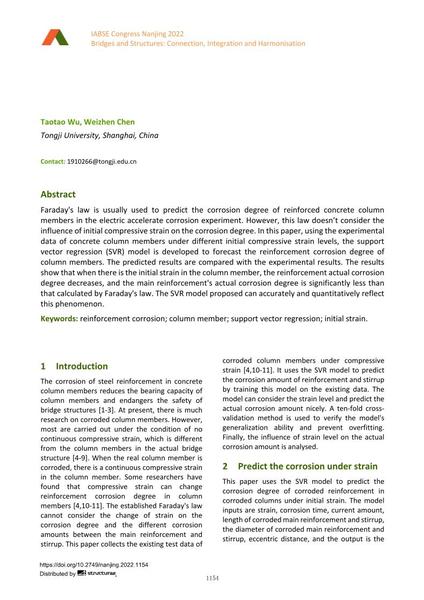Prediction of Concrete Column Reinforcement Corrosion Degree Under Initial Strain Based on Support Vector Regression

|
|
|||||||||||
Bibliographic Details
| Author(s): |
Taotao Wu
(Tongji University, Shanghai, China)
Weizhen Chen (Tongji University, Shanghai, China) |
||||
|---|---|---|---|---|---|
| Medium: | conference paper | ||||
| Language(s): | English | ||||
| Conference: | IABSE Congress: Bridges and Structures: Connection, Integration and Harmonisation, Nanjing, People's Republic of China, 21-23 September 2022 | ||||
| Published in: | IABSE Congress Nanjing 2022 | ||||
|
|||||
| Page(s): | 1154-1160 | ||||
| Total no. of pages: | 7 | ||||
| DOI: | 10.2749/nanjing.2022.1154 | ||||
| Abstract: |
Faraday's law is usually used to predict the corrosion degree of reinforced concrete column members in the electric accelerate corrosion experiment. However, this law doesn’t consider the influence of initial compressive strain on the corrosion degree. In this paper, using the experimental data of concrete column members under different initial compressive strain levels, the support vector regression (SVR) model is developed to forecast the reinforcement corrosion degree of column members. The predicted results are compared with the experimental results. The results show that when there is the initial strain in the column member, the reinforcement actual corrosion degree decreases, and the main reinforcement's actual corrosion degree is significantly less than that calculated by Faraday's law. The SVR model proposed can accurately and quantitatively reflect this phenomenon. |
||||
| Keywords: |
reinforcement corrosion column member support vector regression initial strain
|
||||
| Copyright: | © 2022 International Association for Bridge and Structural Engineering (IABSE) | ||||
| License: | This creative work is copyrighted material and may not be used without explicit approval by the author and/or copyright owner. |
||||
